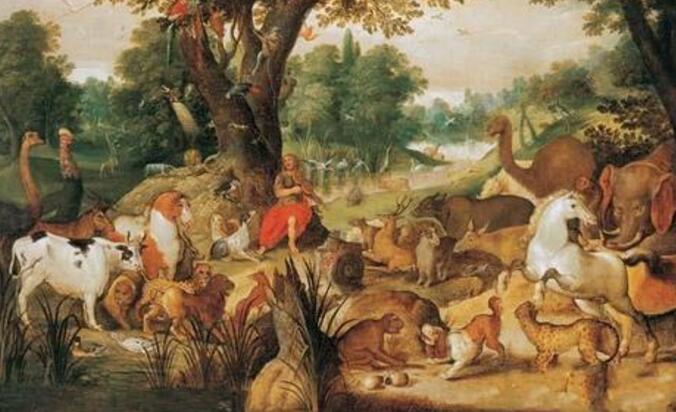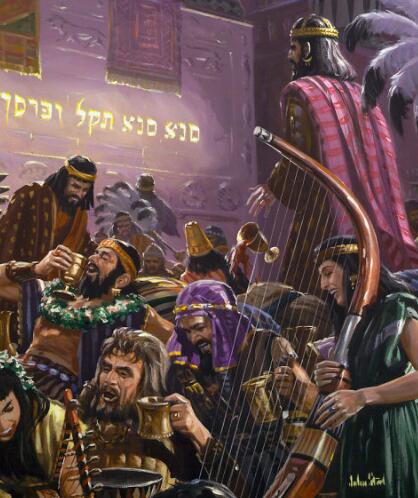15-18
15.Adam's Apple喉结
亚当是圣经中人类的始祖,而苹果的历史比人类的历史还悠久。在世界各文明古国的民间故事和神话传说中,苹果都是受人喜爱的一种果实。英语中有个谚语:An apple a day keeps the doctor away.但据圣经故事上说,苹果也给人类带来了麻烦,男人的喉结就是因吃苹果引起的。

传说的伊甸园
《旧约.创世纪》第3章讲到人类的起源,传说上帝创造人类的始祖亚当和夏娃,在东方的伊甸(Eden)建立了一个园子给他们居祝伊甸园里生长着悦人眼目的各种树木,树上长着各种各样的果实。上帝吩咐亚当说:你可以随意吃园中的各种果子,只是不能吃那棵分别善恶树上的果实,吃了必定要死。这种"禁果"就是apple。后来,亚当的配偶夏娃听信蛇的诱惑,不顾神谕,吃了善恶树上的禁果,还把这果子给它丈夫吃。亚当因心怀恐惧,吃时仓促,有一片果肉哽在吼中,不上不下,留下个结块,就叫"亚当的苹果"两人吃了这果子就心明眼亮,能知善恶美丑。但是由于他们违背了上帝的告戒而被逐出伊甸园。从此,亚当就永远在脖子前端留下"喉结",作为偷吃禁果的"罪证"。上帝还惩罚亚当,"必汗流满面才能糊口"
不过也说一说是正当亚当吃的时候,上帝来了,所以亚当急忙吞下去,不料哽在喉咙间了。
eg: Your Adam's apple isn't apparent.
Adam's apple can be more clearly seen on men than women's throats.
16.Sell One's Birthright for a Mess of Pottages因小失大;见利弃义
Sell One's Birthright for a Mess of Pottages直译是:"为了一碗红豆汤而出卖了长子继承权"。
《旧约.创世纪》第25章记述了这样一个故事传说:犹太族长以撒的妻子利百加怀孕期间,感觉到2个胎儿在她腹内互相踢打,就去问耶和华,耶和华对她说:"两国在你腹内,两族要从你身上出来,这族必强于那族,将来大的要服小的。"
后来,利百加果然生下一对孪生兄弟,哥哥叫以扫,弟弟叫雅各。两兄弟长大后,以扫好动,常外出打猎;雅各则常在家里帮助料理家务。有一天,以扫打猎回来,又饥又渴,看见弟弟雅各在熬豆汤,就对他说:"我饿极了,给我喝点红豆汤吧!"雅各说:"你要喝汤,就把你的长子权卖给我。"以扫说:"你都要饿死了,要这长子权有什么用呢?"于是,他便按雅各的要求,对天起誓,把长子权卖给雅各,换来饼和红豆汤。以扫吃饱喝足后,起身走了。他哪里想到,为了这碗红豆汤,他的后裔便注定要服事雅各的后裔。
由此,人们用to sell one's birthright for a mess of pottage短语,来比喻to exchange something of lasting value for something that is of value for a short time only; to suffer a big loss for a little gain.这个成语常缩略为for a mess of pottage的形式。有时也可用to sell one's birthrights.
eg: It was argued that joining the Common Market……would be giving away her national rights and advantages for a mess of pottage.
There are many, many people who are willing to prostitute their intelligence for a mess of pottage.
17.The Apple of Ones' Eye
The Apple of Ones' Eye的字面意思是"某人眼里的苹果",在这里,apple指的是thepupil(瞳孔,眼珠),大概因眼珠圆的象苹果之故。瞳孔是眼睛最重要的部分,失去瞳孔,光线就无法通过虹膜中心的圆孔进入眼内而变成了瞎子。所以,这个成语常用来比喻象爱护眼珠一样爱护某个最心爱的人或珍贵的东西,即表示a cherished person or object; sth extremely precious to one; sb dearly loved等意
这个成语来字《旧约。申命记》(Deuteronomy)第32章"耶和华遇见他在旷野荒凉、野兽吼叫之地,就环绕他,看顾他,保护他如同保护眼里的瞳人。"在圣经其他地方也有类似的话。英文版《旧约。诗篇》(Psalm)第17章有这样的句子:"Keep me as the apple of the eye, hide me under the shadow of the wings"
成语the apple of one's eye是固定结构,不得写成the apple of the eye of…的形式;在搭配上,它常与动词be,keep, carefor等连用。按其想象意义,它与汉语成语"掌上明珠"颇相似,但其比喻的对象较汉语"掌珠"更广,因"掌珠"通常指心爱的女儿,而不能用与其他场合。
eg: Little Mary is the apple of her father's eye
Mind the reputation of your school as you care for the apple of your eye.
18.The writing/Finger on the Wall不详之兆;大祸临头
这个成语的字面意思是"墙上的文字(或手指)",而实际含义是a sign or warning of impending disaster(迫在眉睫的凶兆);a sign that sth bad will happen; a feeling that ones number is up;等等。其语言外壳与内涵是怎样联系起来的呢?还是出自《圣经》。

伯沙撒的酒宴
据《旧约。但以理书》(Daniel)第5章记述:有一次古巴比伦(Babylonian)的国王伯沙撒(Belshazar)正在宫殿里设宴纵饮时,突然,不知从哪里出现了一个神秘的手指,当者国王的面,在王宫与灯台相对的粉墙上写西了四个奇怪的单词:MENE(弥尼)、MENE(弥尼)、TEKEL(提客勒)、UPHARSING (乌法珥新)。国王张皇失措,惊恐万分,谁也不懂墙上所写的字是什么意思。后来叫来了被虏的犹太预言家但以理,才明白了这几个字的意思就是大难临头。他说:"弥尼就是上帝已经数算你国的年日到此为完毕;提客勒就是你被称在天平里显出你的亏欠;乌法珥新就是你的国分裂,归与玛代人和波斯人。"果然,当夜伯沙撒被杀,又62岁的玛代人大利乌取而代之。
依次,"墙上的文字(或手指)"就表示身死国亡的凶兆。英语中这个成语有几种表达方式:the writing/handwriting on the wall或a finger on the wall,通常与be,like等系动词连用;有时写成see/read the writing on he wall的句型,表示提出警告,such as :Don't you see the writing on the wall, 有时候也可省略onthewall,只说Don't you see the writing?意思也是一样的。
eg: This inexplicable incident seemed, like the Babylonian finger on the wall, to be spelling out the letter of my judgement……
In this house of his there was writing on every wall. His business-like temperament protested against a mysterious warning that she was not made for him.
John's employer had less and less work for him; John could read the writing on the wall.
The writing on the wall is clear: if man behaves like an animal and allow his population to increase while each nation steadily increases he complexity and range of its environment, nature will take her course and the law of the Jungle will prevail.
When Bill's team lost four games in a row, he saw the handwriting on the wall.